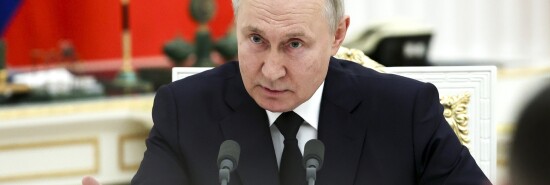
If Putin escalates, US must stand resolute
Washington Examiner
Video Embed
The aftershocks of Yevgeny Prigozhin’s rebellion against Russian President Vladimir Putin continue to reverberate. U.S. policymakers must not let those shocks shake our support for Ukraine.
Prigozhin, leader of the Wagner Group mercenaries, was once a close ally of the Russian president. Now, he has cooked up the most serious threat Putin has ever faced.
UNIVERSAL BASIC INCOME PAYMENTS: BIG CITIES THAT HAVE JUMPED INTO PROGRAMS TO GIVE AWAY MONEY
The Biden administration and Congress must be wary of what might come next. At least for now, Prigozhin is in Belarus. But the warlord retains his military forces, significant wealth, and a personality ill-suited for silent submission. We are unlikely to have seen the last of his dangerous antics.
For Putin, the revolt is painful in three ways, at least.
First, it was a direct challenge by a former ally to Russian federal authority. That makes it a challenge that Putin finds detestable. Putin treasures loyalty and makes a point of viciously penalizing disloyalty. Second, it was a public challenge. Prigozhin made Putin appear weak as he charged on Moscow. For Putin, the perception of weakness is toxic. Third, Prigozhin remains at large and nominally free. He can have no long-term confidence in his safety, but Putin will hate that he had to make a concession to someone who betrayed him so blatantly.
Why should this matter to Americans?
The Russian leader is likely to take new action in the coming days to bolster his sinking credibility. The risk is that he might see escalation against the West as a way to reunify Russians around the idea that he is an irreplaceable modern tsar.
Russians are proud and generally disdainful of the West and NATO. Were Putin to provoke a confrontation with the West, he could appeal to his compatriots’ nationalism and their historic impulse to rally to their leader. The contrast between Putin challenging the West with resolution and Prigozhin, exiled and for the moment puttering in Belarus, would be appealing to the Russian leader. He might also regard escalation as a rapid way to remind partners such as China and Iran that he remains in control and capable of decisive action. Putin cannot afford for those nations to see him as fatally damaged by Prigozhin’s uprising.
What might Putin’s escalation look like?
Confrontation with American or NATO air forces is one possibility. The Russian air force was engaging in increasingly aggressive intercepts of the U.S. military even before Prigozhin’s troublemaking. Russian jets downed a U.S. drone worth $20 million as it flew in international airspace over the Black Sea in March. The Russians also have been harassing U.S. air and ground forces in Syria.
Putin escalating against a NATO member such as one of the Baltic States is also possible, as is a Russian provocation involving nuclear power or nuclear weapons. Putin views nuclear brinkmanship as a way to divide NATO between more resolute members such as the U.S., Britain, and Poland and haverers such as Belgium, Germany, and Spain.
The Biden administration and Congress must stand resolute in the face of any such provocation. The U.S. must respond swiftly to remind Putin that he has far more to lose from an ill-judged confrontation than he has to gain. If he engages militarily with the U.S., he must be met militarily in kind.
It is crucial that he not be allowed to address his own internal problems at the cost of U.S. security. Aside from national security, that would undermine U.S. credibility internationally. It would encourage new threats from China, North Korea, and Iran. It would also encourage allies skeptical of U.S. resolve after the disastrous August 2021 withdrawal from Afghanistan to distance themselves from Washington.
What happened in Russia last week was Putin’s fault. It was he who launched an illegitimate war on Ukraine. It was he who, lacking adequate military preparation and capacity, relied on a psychotic mercenary to bolster his war effort. It was he who tolerated the Wagner Group’s growing power even as Prigozhin launched tirades against Putin’s own government. It is Putin who must find a way out of his mess. It is not for Washington to help him.
As he attempts to do so, the U.S. should not prop up the former KGB man and support him as he tries to evade the consequences of his many mistakes.
